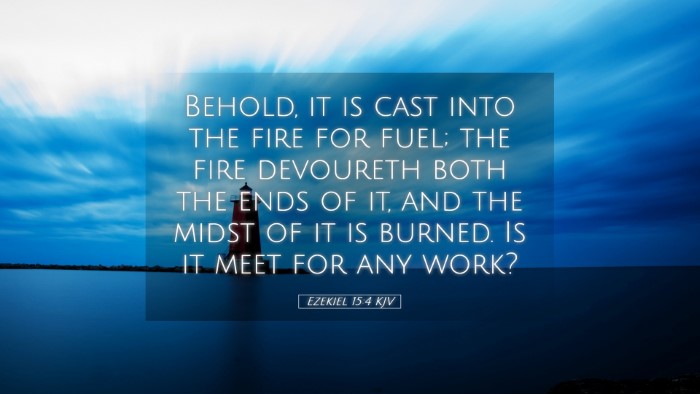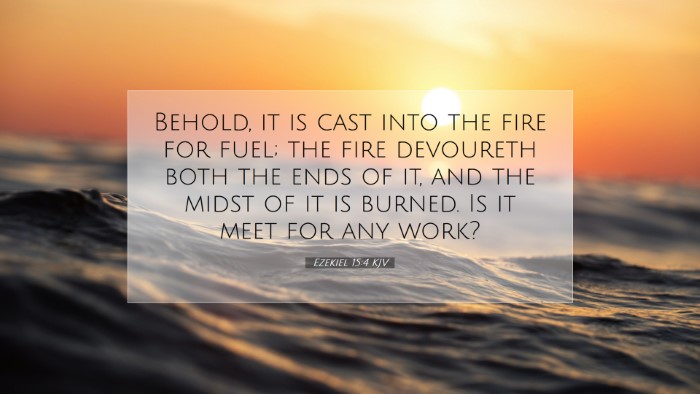Ezekiel 15:4 Commentary
Verse Text: "Behold, is it not cut down to be cast into the fire for fuel? The fire devoureth both the ends of it, and the middle of it is burned. Is it meet for any work?" (Ezekiel 15:4, KJV)
Introduction
This verse serves as a poignant metaphor within the prophetic narrative of Ezekiel. Ezekiel compares the inhabitants of Jerusalem, and particularly the leaders and false comforters, to the wood of the vine, which has little utility beyond being used as fuel for fire. Through the voices of esteemed commentators like Matthew Henry, Albert Barnes, and Adam Clarke, a deeper understanding of this metaphor can be gleaned, shedding light on God's judgment and the holiness required of His people.
Contextual Analysis
The context of Ezekiel 15 highlights God’s judgment upon Israel, focusing specifically on the symbolism of the vine. Vines in ancient Israel were cherished for their fruit, but Ezekiel emphasizes the worthlessness of the vine when it fails to produce. This is particularly striking in a culture that prized vineyards.
Matthew Henry's Insight
Matthew Henry notes that Israel, likened to a vine, had been chosen and set apart for a purpose, yet instead of yielding good fruit, they became unprofitable. He emphasizes that the vine, when stripped of its usefulness, becomes fuel for the fire. This fire symbolizes divine judgment, which purifies and consumes the worthless. Henry articulates that the cutting down of the vine signifies a decisive action by God against those who refuse to abide in Him.
Albert Barnes' Analysis
Albert Barnes further elaborates on this figure of speech, indicating that the vine's primary purpose is to bear fruit. He draws connections to John 15:1-6 where Jesus refers to Himself as the true vine and His followers as branches. Barnes elucidates that just as the vine that does not bear fruit is cast away and burned, so too Israel faces judgment for its unfaithfulness. Thus, the verse helps the reader to understand God's expectations for His people to be fruitful and faithful, otherwise facing dire consequences.
Adam Clarke's Commentary
Adam Clarke's commentary dives into the implications for spiritual leadership, noting that leaders who fail to guide the people towards righteousness will face similar judgment. He interprets the fire as both a cleansing and a consuming force. Clarke postulates that the imagery of the vine demonstrates the futility of relying upon one’s past glory or status, urging that true worth is found in producing spiritual fruit that honors God.
Theological Implications
This verse calls for a self-examination of one’s own spiritual standing. It can be interpreted as a divine warning that emphasizes accountability. Theological themes emerging from Ezekiel 15:4 include:
- Judgment: The inevitability of divine judgment for unfruitfulness is a central theme. The symbolism of the vine being cast into fire speaks to the seriousness of failing to maintain a covenant relationship with God.
- Utility: The necessity of being useful in God’s kingdom is underscored. Just as only the fruitful vine has worth, God's people are called to be a reflection of His glory through their actions and obedience.
- Transformation: The idea of being subjected to fire can also be viewed as a means of transformation. The refining process, although painful, is necessary for producing holiness and a deeper relationship with God.
Practical Applications
The insights drawn from this verse can be practically applied in various ministries and personal practices:
- Spiritual Fruitfulness: Believers are encouraged to assess their spiritual walk regularly, ensuring that their lives produce fruit that aligns with God’s will.
- Church Leadership: Leaders are reminded of their responsibility to foster growth and maturity among their congregations, leading by example towards holiness.
- Community Impact: The church is called to be a light in the community, producing fruit that contributes to the common good and glorifies God in all interactions.
Conclusion
Ezekiel 15:4 serves as a powerful reminder of the necessity for spiritual vigilance and productivity. Through the combined insights of Matthew Henry, Albert Barnes, and Adam Clarke, the warning contained in this verse resonates strongly across generations, reminding the church of its calling to remain fruitful and aligned with God’s purposes. The stark imagery of the vine cast into the fire ensures that the message of accountability and the transformative power of grace remain central to Christian faith and practice.


